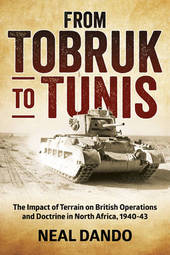
|
From Tobruk to Tunis: The Impact of Terrain on British Operations and Doctrine in North Africa, 1940-1943
Hardback
Main Details
| Title |
From Tobruk to Tunis: The Impact of Terrain on British Operations and Doctrine in North Africa, 1940-1943
|
| Authors and Contributors |
By (author) Neal Dando
|
| Series | Wolverhampton Military Studies |
|---|
| Physical Properties |
| Format:Hardback | | Pages:216 | | Dimensions(mm): Height 234,Width 156 |
|
| Category/Genre | Second world war |
|---|
| ISBN/Barcode |
9781910294000
|
| Classifications | Dewey:940.54231 |
|---|
| Audience | |
|---|
| Illustrations |
12 b/w photos, 24 colour maps
|
|
Publishing Details |
| Publisher |
Helion & Company
|
| Imprint |
Helion & Company
|
| Publication Date |
30 April 2016 |
| Publication Country |
United Kingdom
|
Description
This book focuses on the extent to which the physical terrain features across Egypt, Libya and Tunisia affected British operations throughout the campaign in North Africa during the Second World War. One main theme of the work analyses the terrain from the operational and tactical perspective and argues that the landscape features heavily influenced British operations and should now be considered alongside other standard military factors. The work differs from previous studies in that it considers these additional factors for the entire campaign until the Axis surrender in May 1943. Until now it has been widely assumed that much of the Western Desert coastal plateau was a broadly level, open region in which mobile armoured operations were paramount. However this work concentrates on the British operations to show they were driven by the need to capture and hold key features across each successive battlefield. At the operational level planning was led by the need to hold key ground across Libya and especially the province of Cyrenaica during the crucial middle period of the campaign. A secondary theme of the work argues that British forces began to improvise certain tactical doctrines, which altered the early practice of combined arms assaults into one of the Infantry and Armoured formations fighting largely separated battles until the autumn of 1942. Other developments in doctrine which were affected by the terrain included the practice of unit dispersal to hold key ground and the use of temporary units such as Jock columns to harass and engage the enemy. The two themes are inter-linked and contribute fresh insights to the debate on British methods of warfare. The author has consulted key primary documents, reports, war diaries and published memoirs, from major UK archives and compared these with the campaign historiography to develop the main themes of the work. These include the National Archives, the Churchill Archives Centre, the Liddell-Hart Centre for Military History, the National Army Museum, John Rylands Centre, Imperial War Museum at London and Duxford and London and the Tank Museum Archives at Bovington. The sources include unit war diaries, after action reports, along with many of the key published and some unpublished memoirs. His text is supported by 24 pages of specially-commissioned colour maps.
Author Biography
Neal Dando studied history at Plymouth University and gained his first degree in 2002. He worked in the Heritage industry before returning to postgraduate studies. His recently completed thesis has argued the importance of terrain in military studies and his main research has focussed on British operations during the Second World War, but he has always maintained a strong interest in many aspects of land warfare from the Black Powder period through to the modern era. Neal has contributed a chapter to the forthcoming work on changes in British methods of warfare by Ross Mahoney, Stuart Mitchell and Michael LoCicero (eds.) "A Military Transformed? Transformation and Innovation in the British Military, 1972-1945" (Solihull: Helion). He has been an Associate Lecturer at Plymouth University since 2010. His current research interests include further analysis of subsequent British operations in the Mediterranean theatre and comparative studies of the effectiveness of British Army Divisions in combat.
ReviewsIt is clearly written and informative. * The Armourer * It is interesting to note that for me and many people like me, our only knowledge of the war in North Africa so far has come from films such as Tobruk. I have never taken the trouble to seek out books that might give a different viewpoint and it is quite by chance that this particular book, which sets a number of records straight, has come into my possession now. Neil Dando's book is comprehensive and authoritative. * Books Monthly * `A worthy study that sees the desert campaign from a genuinely fresh perspective' * History of War Magazine *
|